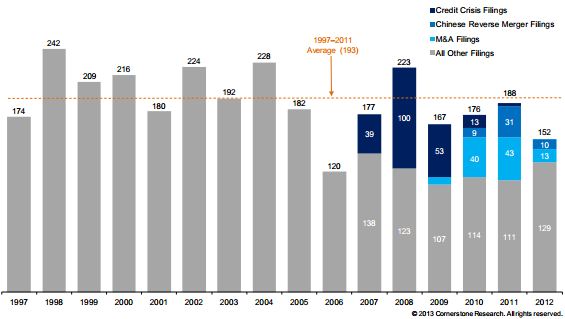Similar Structured Product Premia in US and Europe
(Jul 2013)
One point we've made again and again in our research is that structured products -- debt securities with market-contingent payoffs -- tend to be priced at a premium to face value. We have documented premia in reverse convertibles, autocallables, absolute return barrier notes, principal-protected notes, dual directionals, and over 17,000 individual products freely available in our searchable structured product database.
Recently, the SEC has required structured product issuers to disclose an...
Reverse Convertibles and Event Risk
(Jun 2013)
Reverse convertibles are short-term debt securities issued by banks whose return of principal at maturity is contingent upon the returns of the linked stock. Although these notes typically pay relatively high coupons, they expose investors to losses on the underlying asset, especially if those losses are beyond the trigger level. Academic research shows that these coupons are not adequately compensating the investor for the market risk that they are bearing by investing in the notes. For...
Investors Bristle at New Structured Product Valuations
(Jun 2013)
Back in February, the SEC issued a letter to structured product issuers that required them to estimate and prominently state the estimated value of the notes to investors. According to Risk.net, as issuers have begun doing so, many investors have "expressed surprise" at how low those valuations are.
However, these valuations should be no surprise to anyone familiar with the structured product literature, which has documented significant discounts for a wide variety of product types. You can...
Investors Returning to Capital-at-Risk Products
(May 2013)
Yakob Peterseil of Risk.net recently noted that "[b]anks are boosting issuance of leveraged notes linked to US equity indexes and notes that pay out when yield curves steepen." According to the article, reverse convertibles and buffered notes are seeing a resurgence as investors begin to be more optimistic about stock market growth. In addition, principal-protected structures like structured certificates of deposit and principal-protected notesare falling out of favor as attractive terms are...
Update on Apple-Linked Structured Products
(May 2013)
A few months ago, SLCG issued a working paper that studied the decline in value of Apple-linked structured products. Jason Zweig of the Wall Street Journal also wrote a piece about these findings, most notably that Apple's stock price decline had serious repercussions in the structured product market. Apple's stock price has continued to fall and we recently updated the paper to show how this decline is still affecting investors in structured products.*
Since reaching $700 in September of...
Resurgence of Commercial Mortgage Backed Securities and Decreased Underwriting Standards
(Apr 2013)
Late last week, Reuters reported that the issuance of so-called 'large-loan' Commercial Mortgage Backed Securities (CMBS) has recently spiked and that the increase in volume may be due in part to more lenient underwriting standards. Large-loan CMBS issuance in the first few months of 2013 has already surpassed that of 2012.
CMBSs are created by securitizing a pool of commercial mortgage loans such that an investment in a CMBS is a claim on the future cashflows from the pool of commercial...
Are ETF Flows Costly to ETF Investors?
(Apr 2013)
Exchange-traded funds (ETFs) are often lauded for their ability to efficiently create or redeem shares in response to changes in demand for the fund (known as fund flows). However, new research suggests that some ETFs that hold international securities may face transactional frictions that prevent them from tracking their benchmarks as well as other ETFs.
When there is an imbalance between supply and demand for an ETF, authorized participants (APs) create or redeem shares of the ETF to...
Securities Class Action Filings Decrease in 2012
(Feb 2013)
Earlier this year, Cornerstone Research released 2012 review of Securities Class Action Filings in conjunction with the Stanford Law School -- see the press release. The report notes that the number of federal securities class action filings have decreased in recent years and, in particular, has fallen nearly 20% from 2011 to 2012. For the number of filings over the past sixteen years can be found below (Figure 2 in their report).
Cornerstone attributes the majority of the decline in class...
FTC Releases Report on Debt Buying Industry
(Feb 2013)
The Federal Trade Commission (FTC) released their report yesterday on the "Structures and Practices of the Debt Buying Industry". This rather lengthy report brings into focus the industry -- debt collection and debt buying -- that is responsible for more consumer complaints than any other industry.
"Debt buying" is the practice of purchasing debts from creditors. A creditor may decide that it is unlikely the debtor will repay a debt and as a result may sell the rights to collect the debt for...

